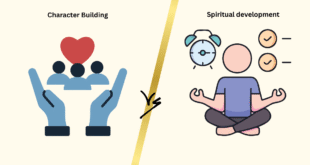Dr. Muhammad Younus Khalid- Parenting Coach
Every parent faces moments when their child refuses to listen, throws a tantrum in the grocery store, or argues endlessly about bedtime. These situations can leave parents feeling frustrated, helpless, or even guilty. But misbehavior is not a sign of bad parenting, it’s part of childhood development.
The real challenge lies in coping with misbehavior in ways that teach children responsibility, emotional control, and respect, without breaking their spirit or damaging the parent-child bond.
This article explores the reasons children misbehave, the short- and long-term effects, and proven strategies for parents to handle misbehavior constructively. Whether you’re raising toddlers, school-age children, or teenagers, these insights will help you foster positive behavior and a peaceful home.
Understanding Misbehavior
Misbehavior doesn’t happen in isolation. It’s often a child’s way of communicating unmet needs, strong emotions, or confusion about boundaries. Understanding the “why” behind behavior is the first step toward effective parenting.
Common Reasons for Misbehavior
- Attention-seeking – Children crave connection and may misbehave to get noticed.
- Testing limits – Misbehavior often occurs when children explore boundaries.
- Unmet needs – Hunger, fatigue, or overstimulation can trigger defiance.
- Developmental stage – Toddlers, tweens, and teens misbehave differently as part of growth.
- Modeling behavior – Children mirror what they see at home or among peers.
- Emotional struggles – Anxiety, jealousy, or stress can manifest as disruptive actions.
By identifying the root causes, parents can shift from punishment to guidance.
The Effects of Misbehavior
While misbehavior is natural, how parents respond determines whether it becomes a learning moment or a recurring problem.
- For children: Consistent misbehavior without guidance can lead to poor self-control, academic struggles, and difficulty in relationships.
- For parents: Frequent misbehavior creates stress, exhaustion, and sometimes resentment.
- For families: Ongoing misbehavior can disrupt routines and create tension between siblings or spouses.
That’s why coping with misbehavior requires proactive, thoughtful strategies instead of reactive punishments.
Strategies for Coping with Misbehavior
-
Stay Calm and Collected
Children learn from how we react. Yelling or losing patience often escalates the situation. Taking a deep breath and staying calm allows you to model self-control.
-
Understand the Trigger
Ask yourself: Is the child hungry, tired, bored, or overstimulated? Addressing the root cause can quickly reduce misbehavior.
-
Set Clear Expectations
Children thrive on structure. Be specific about rules: “We use kind words” instead of “Be good.”
-
Use Positive Reinforcement
Praise good behavior more often than punishing bad behavior. A child who hears, “I love how you shared your toy,” is motivated to repeat it.
-
Offer Choices
Giving children age-appropriate choices reduces power struggles. For example: “Do you want to brush your teeth before or after putting on pajamas?”
-
Natural and Logical Consequences
Instead of harsh punishments, let consequences teach responsibility. If a child refuses to wear a coat, feeling cold for a few minutes is a natural lesson.
-
Teach Problem-Solving
Guide children in finding solutions: “You both want the same toy. What’s a fair way to share it?” This develops empathy and cooperation.
-
Be Consistent
Mixed signals confuse children. Consistency in rules and consequences builds trust and understanding.
-
Model Respectful Behavior
Children copy adults. If they see calm communication, they’ll learn to manage their own frustrations respectfully.
Age-Specific Approaches to Misbehavior
Toddlers and Preschoolers
- Use distraction and redirection.
- Keep instructions short and simple.
- Establish routines to create predictability.
School-Age Children
- Encourage responsibility with chores.
- Use family meetings to discuss behavior.
- Focus on teaching self-regulation skills.
Teenagers
- Respect their need for independence.
- Negotiate boundaries together.
- Encourage open communication without judgment.
Cultural and Social Context in Western Societies
Parenting in the US and Western societies comes with unique challenges:
- Busy schedules – Parents often juggle work and parenting, leaving less time for parenting guidance.
- Peer influence – Media, friends, and social norms shape children’s behavior.
- Individualism – Children may assert independence earlier, which can be mistaken for misbehavior.
Understanding these cultural factors helps parents respond with empathy and realism.
Positive Discipline vs. Punishment
Punishment may stop misbehavior temporarily, but it rarely teaches long-term lessons. Positive discipline focuses on guidance, accountability, and respect.
Examples:
- Instead of spanking, use a calm conversation about consequences.
- Replace grounding with opportunities to repair mistakes, apologizing, helping with tasks.
- Use time-ins, sitting with the child to reflect instead of isolating time-outs.
This approach fosters emotional intelligence and strengthens family bonds.
Teaching Emotional Intelligence
One of the most effective ways of coping with misbehavior is teaching children to recognize and manage emotions.
- Name feelings: “You’re angry because your toy broke.”
- Validate emotions while setting limits: “It’s okay to be mad, but it’s not okay to hit.”
- Practice coping skills like deep breathing or drawing.
Over time, children learn healthier ways to handle frustration.
When to Seek Professional Help
Sometimes misbehavior signals deeper issues like ADHD, anxiety, or trauma. Seek support if:
- Misbehavior is frequent and extreme.
- It affects school performance or friendships.
- It causes safety concerns for the child or others.
Pediatricians, counselors, or parenting coaches can provide tailored guidance.
Building Strong Parent-Child Relationships
Ultimately, the best way to reduce misbehavior is to build a secure, loving relationship. When children feel valued, connected, and understood, they are less likely to act out.
Ways to strengthen bonds:
- Spend one-on-one time daily.
- Listen actively without judgment.
- Celebrate achievements, big or small.
- Share family traditions and values.
Conclusion
Coping with misbehavior is one of the most important and challenging parts of parenting. Misbehavior is not a sign of failure; it’s a natural part of growth and learning. What matters most is how parents respond.
By staying calm, setting clear boundaries, using positive discipline, and nurturing emotional intelligence, parents can turn misbehavior into opportunities for growth. In Western societies where families face unique pressures, these strategies empower parents to raise confident, respectful, and emotionally balanced children.
Remember: misbehavior is a chance to teach, not just to punish. When parents guide with love, patience, and consistency, children develop the life skills they need to thrive.
 Edutarbiyah English Blog of Parenting and Tarbiyah
Edutarbiyah English Blog of Parenting and Tarbiyah



